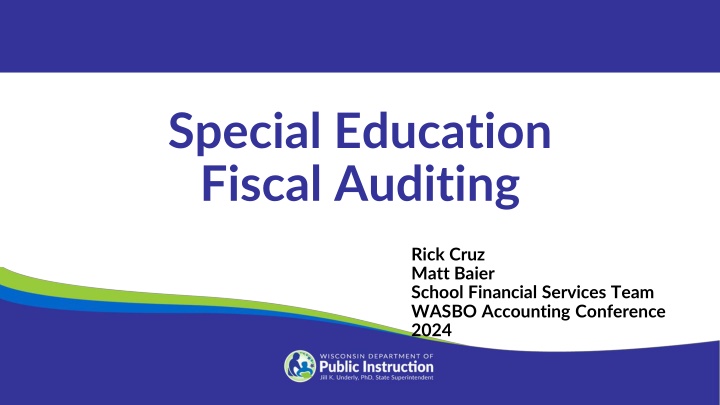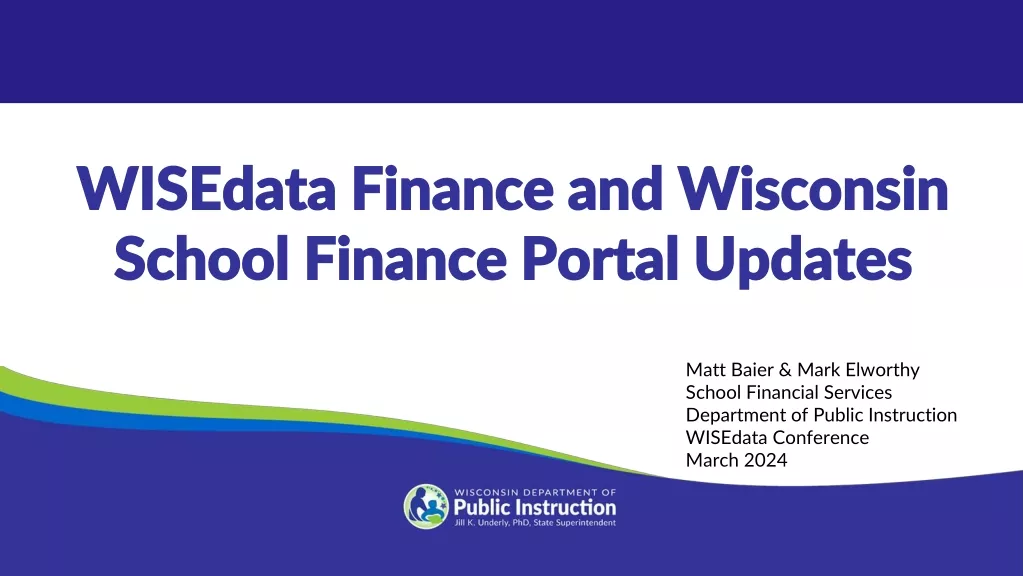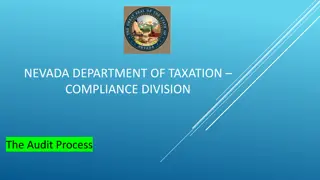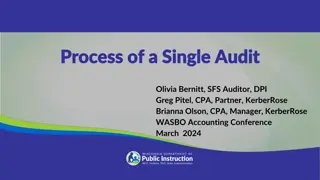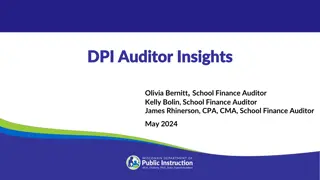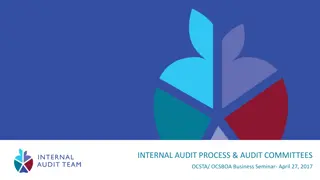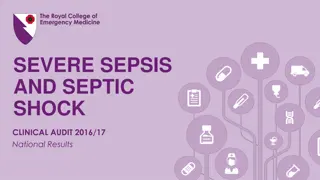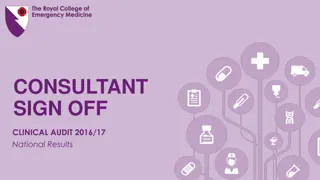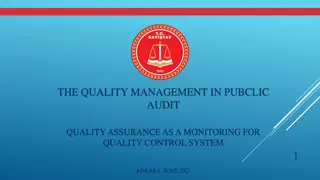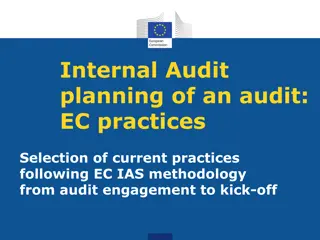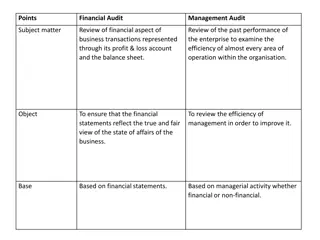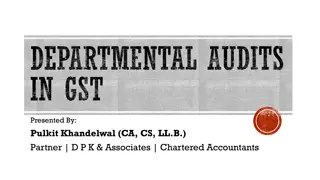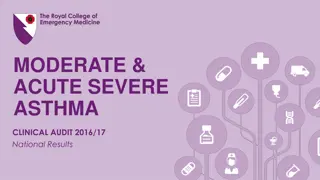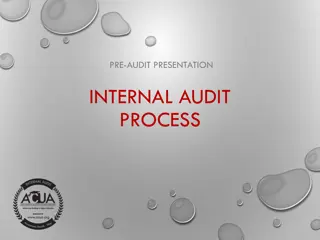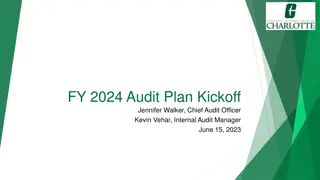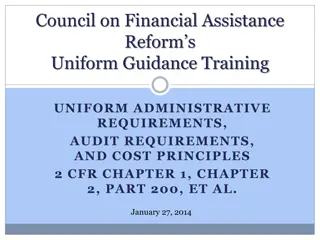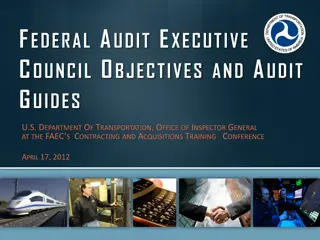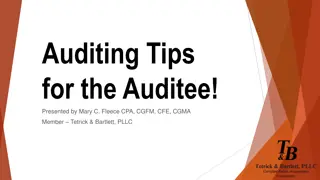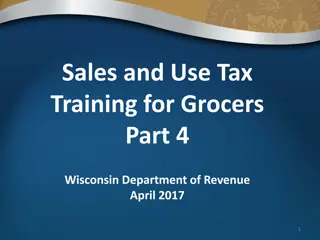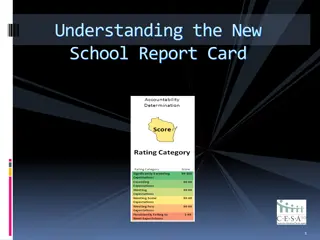Audit Requirements and Compliance Guidelines for Wisconsin Educational Institutions
Explore the audit requirements and compliance guidelines applicable to educational institutions in Wisconsin, including special education fiscal auditing, Uniform Administrative Requirements, and risk-based program identification. Learn about the State Single Audit Guidelines, Wisconsin School District Audit Manual, and the necessity of internal control assessments to ensure financial accountability.
Download Presentation

Please find below an Image/Link to download the presentation.
The content on the website is provided AS IS for your information and personal use only. It may not be sold, licensed, or shared on other websites without obtaining consent from the author.If you encounter any issues during the download, it is possible that the publisher has removed the file from their server.
You are allowed to download the files provided on this website for personal or commercial use, subject to the condition that they are used lawfully. All files are the property of their respective owners.
The content on the website is provided AS IS for your information and personal use only. It may not be sold, licensed, or shared on other websites without obtaining consent from the author.
E N D
Presentation Transcript
Special Education Fiscal Auditing Rick Cruz Matt Baier School Financial Services Team WASBO Accounting Conference 2024
Audit Requirements Audit Requirements 2 CFR 200 Subpart F - Uniform Administrative Requirements, Cost Principles and Audit Requirements for Federal Awards State Single Audit Guidelines (SSAG) Incorporates federal audit requirements under (Uniform Guidance) Applicable when the following three conditions are met: Uniform Guidance applies The agency has received funding from a state department (either state or federal pass-through funding) Granting agency has not otherwise specified that SSAG does not apply 4
Audit Requirements Audit Requirements Wisconsin School District Audit Manual Appendix to the State Single Audit Guidelines (SSAG) and incorporates federal audit requirements for entities subject to Uniform Guidance requirements (expending more than $750,000 in federal funds) Establishes auditing and program-specific compliance requirements for entities that do not meet the single audit federal expenditure threshold of $750,000 4
Audit Requirements Audit Requirements Wisconsin Public School Districts, Cooperative Educational Service Agencies (CESA), County Children with Disability Education Boards (CDEB), and Independent Charter Schools (ICS) are required to have an audit of compliance requirements and must also issue a report on its system of internal control over compliance in accordance with the Wisconsin Public School District Audit Manual. Audit must include examination of basic financial statements by a CPA and comply with Generally Accepted Accounting Principles (GAAP) and use the Wisconsin Uniform Financial Accounting Requirements (WUFAR). 4
Audit Requirements Audit Requirements Risk-based approach for identifying state major programs by factors, including threshold amounts DPI considers certain programs to be designated major programs regardless of factors that must be tested every year, including State Special Education and School Age Parents Aid (20.255(2)(b) Wisconsin School District Audit Manual 4
Special Education Audit Program Special Education Audit Program Wisconsin School District Audit Manual section 2.2 Activities Allowed or Unallowed/Allowable Costs 2.2.2.1 / 2.2.3.1 Compliance Requirement 2.2.2.1.1 / 2.2.3.1.1 Agencies receive partial reimbursement for certain instructional, transportation and contracted costs of special education and related services in the prior year Staff must be appropriately licensed for a special education work assignment listed in state statute in order for their salary and benefits or contracted cost to be eligible for aid No Valid License Reporting 4
Staff Must Be Properly Licensed Staff Must Be Properly Licensed License must be current and valid License must be appropriate for the individual s actual assignment Valid Reporting and License Codes for Special Education/Pupil Services Staff 8
License Checking Responsibility License Checking Responsibility DPI generates No Valid License list from cross-check between district s position report in WISEstaff and the DPI license database, Electronic Licensing Online (ELO) List is accessible by LEA through the No Valid Special Education License Report in WISEgrants. Auditors record questioned cost information through the report. Costs submitted through the No Valid Special Education License Report must reflect the Special Education Annual Report in WiSFiP 10
No Valid License Report No Valid License Report LEA accesses the report through WISEgrants. Requires appropriate access to the applicable agency. On the report page, either a message will state that the agency had appropriately licensed staff during the prior year (no further action required) OR the user will see a report with staff identified through the WISEstaff audit as not having an appropriate license for their position and area (or grade range) during the prior fiscal year. 13
No Valid License Report No Valid License Report Report lists staff information including position/area, license information, and reason for ineligibility LEA completes the report by adding the Object (salaries, benefits, or contracted costs), Function, Project (011, 019, or 340 series), and compensation Amount (which must tie back to the Special Education Annual Report) Voluntary option for agency users to provide agency response. Does not guarantee any change in the questioned cost 13
No Valid License Report No Valid License Report LEA submits the NVL Audit amounts to DPI through the report Due before audited financial statements Aid payments begin in November No Valid License process completed in September NVL Audit Report - Guidance for the Field technical assistance 13
Special Education Audit Program Special Education Audit Program WUFAR coding Activities Allowed or Unallowed/Allowable Costs 2.2.2.1 Compliance Requirement 2.2.2.1.2 Agencies required to report fiscal information to DPI using WUFAR under Fund 27 Findings under this requirement not required unless auditor believes expenditures were either deliberately miscoded for the purpose of receiving aid or grant funds, meeting IDEA Maintenance of Effort OR miscoded as of a result of a significant and/or ongoing management concern. 4
Proper WUFAR Coding Proper WUFAR Coding Possible scenarios to check to ensure Fund 27 costs are reported correctly: 1) Check to make sure that all accounts are pushing to WISEdata Finance and have appropriate Project Codes assigned. 2) Please review 290 Object codes to make sure you are coding as aidable only the eligible 290 objects to project 011 (292, 293, 295, 296 only) 3) Look for any Fund 27 accounts that did not get updated to the new Special Education Coordination or Pupil Services functions. Accounts still tied to the retired functions do not get pushed to WISEdata Finance at all. a) Most of the lost expenditures have been tied back to 223300 - which need to reclassified as either 223310 or 223390. 24
Special Education Audit Program Special Education Audit Program Fund 27 accounting Activities Allowed or Unallowed/Allowable Costs 2.2.2.1 Compliance Requirement 2.2.2.1.3 LEA s general ledger for Fund 27 must support expenditures reported through the Special Education Annual Report, formerly the PI-1505-SE Creating new reporting in the Wisconsin School Finance Portal (WiSFiP) for 2024-25 forward Will pull in LEA financial data through WISEdata Finance Same finding requirements as 2.2.2.1.2 4
Proper WUFAR Coding Proper WUFAR Coding Possible scenarios to check to ensure Fund 27 costs are reported correctly: 1) Ensure the Fund 27 / Fund 10 off-setting Fund Transfer Revenue and Expenditure accounts are equal and Fund 27 2) Check to make sure that all grant expenditures have a matching revenue amount 3) Look for any FY 2023-2024 Fund 27 accounts that do not have a project code. The LEA can successfully push a 000 project code to WISEdata Finance, but the Special Education Annual Report does not know where to put it. 24
Special Education Audit Program Special Education Audit Program Privately Contracted Special Education Services Activities Allowed or Unallowed/Allowable Costs 2.2.2.1 Compliance Requirement 2.2.3.1.2 Eligible services listing: 2011 Act 105 & 2013 Act 255 Funding Guidance Contracted services must be provided by individuals with appropriate DPI licensure Private School Tuition is not eligible. Private schools may provide eligible services, but the service must be coded separately from ineligible tuition Finding is not required if ineligible expenditures are re-coded to the correct account 4
Special Education Audit Program Special Education Audit Program Specialized Transportation Activities Allowed or Unallowed/Allowable Costs 2.2.3.1 Compliance Requirement 2.2.3.1.3 / 2.2.3.1.4 / 2.2.3.1.5 / 2.2.3.1.6 Transportation for one or more specific students, as included in their IEPs Pupil Transportation Aid eligibility possible in certain circumstances LEAs need prior approval from DPI to purchase vehicles or equipment with a unit cost of at least $10,000 for the cost to be aid eligible Maintenance costs aid eligible for vehicles used exclusively for specialized transportation Finding not required if ineligible expenditures re-coded 4
Specialized Transportation Specialized Transportation Pupil transportation in Fund 27, Project 011 Did all students have transportation included in their IEP? Exceptions: Listed in another student s IEP (e.g. peer mentor) Incidental Benefit : Picked up at same household, didn t displace another pupil with IEP, didn t increase route cost/capacity Accommodation for newly homeless students or foster care in first 20 days to use specialized route w/o disqualifying it 18
Transportation Transportation Can a student be counted for Pupil Transportation Aid AND eligible for Special Education Categorical Aid for specialized transportation? Students with IEPs that are transported on a regular bus route with their peers are eligible for Pupil Transportation Aid. If the student has support services, such as a supplemental aide, while being transported on the regular bus route, these costs could be eligible for IDEA funding or State Special Education Categorical Aid. 19
Vehicle/Equipment Purchase Vehicle/Equipment Purchase Purchase of vehicles or equipment with a unit cost of at least $10,000 requires prior approval from DPI Definition of prior approval depends on funding source: For state categorical aid eligibility, prior approval requires completion and approval of Vehicle Purchase - Categorical Aid Request form For federal grant eligibility, prior approval is provided through budget approval in WISEgrants See Specialized Transportation Aid Eligibility and Funding document 21
Grant Payment Reconciliation Grant Payment Reconciliation Grant money accounted for in Fund 27, or related to special education, that is not received directly from DPI, but is received from or paid to another LEA, CESA or CCDEB should be recorded as a Grant Payment Out (GPO) or Grant Payment In (GPI). This is commonly IDEA Flow-through/Preschool funds, although also applies to any Fund 27 grant funds, including federal stimulus grants (ESSER/GEER). The purpose of identifying these grant payments is to ensure state aid is not paid on expenditures funded with grant money. 27
Offsetting Offsetting s. 115.88 (7), Wis. Stats.: OFFSETTING RECEIPTS. In any school year, the following revenues shall be deducted from costs aidable under this section before aids are calculated under this section: (a) Any federal operational revenues expended on costs aidable under this section. 47
Reconcile Grant Expenditures Reconcile Grant Expenditures Using IDEA grants (formula and discretionary) as an example: 1. Ensure that your IDEA Flow-through / Preschool / Discretionary grant claims match the your Fund 27 Project 34X expenditures in WISEdata Finance / Special Education Annual Report and your Fund 27 Source 730 revenues 1. Identify Object 38X (382 / 383 / 386) expenditures for Grant Payments Out. While you re at it, make sure the Fund 27 Object 38X expenditures match the claimed amounts in WISEgrants. 29
Reconcile Grant Expenditures Reconcile Grant Expenditures 3. The previous process was to complete the Grant Payments Sent to Other Entities and the Grant Payments Received from Entities in the PI-1505-SE. With the next generation of reporting and the Special Education Budget/Annual Report in WiSFiP, GPO and GPI will be itemized in a similar fashion, based on specific accounts in WISEdata Finance, as a triggered Addenda. This will allow us to complete the necessary data collection consistent with existing reporting. 29
Problems Problems Incorrect Reporting Incorrect Reporting USDE has been emphasizing the difference within federal programs between subgranting and contracting, particularly with regard to IDEA Grants from CESA (i.e. Transition Improvement Grant) lose their federal identity & are coded to Project 019 in the SPED Annual Report. The key is when you use your direct DPI grants (state or federal) to pay another aid eligible entity are reported as GPI and GPO 46
Resources Resources Wisconsin School District Audit Manual: dpi.wi.gov/sfs/finances/auditors/overview Special Ed/SAP Categorical Aid: dpi.wi.gov/sfs/aid/special-ed/sped-sap/overview No Valid License guidance dpi.wi.gov/sfs/sped-no-valid-license-nvlquestioned-cost-process-fy-2021-22 Rick Cruz ricardo.cruz@dpi.wi.gov (608) 266-8255 50
